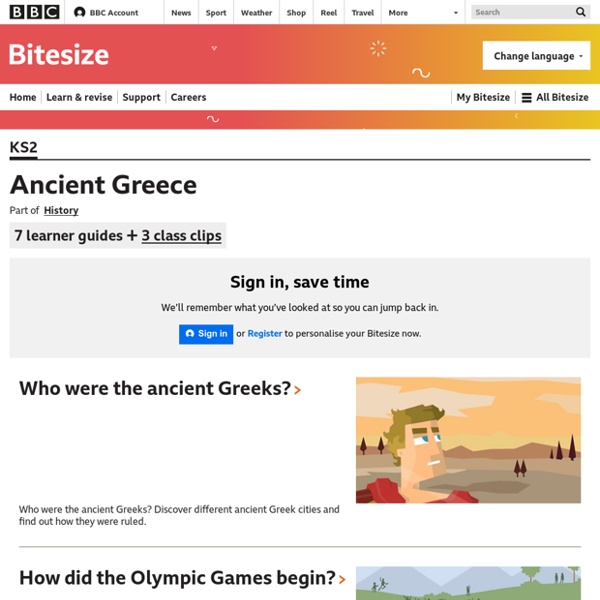Zoom
Trash
Related:



https://www.bbc.com/education/topics/z87tn39
History: Ancient Greece for Kids Ancient Greece was a civilization that dominated much of the Mediterranean thousands of years ago. At its peak under Alexander the Great, Ancient Greece ruled much of Europe and Western Asia. The Greeks came before the Romans and much of the Roman culture was influenced by the Greeks. Ancient Greece formed the foundation of much of Western culture today. Ancient Greece - History, mythology, art, war, culture, society, and architecture. The Ancient Olympics Ancient and Modern Olympic SportsA Tour of Ancient OlympiaThe Context of the Games and the Olympic SpiritAthletes' Stories Frequently Asked Questions About the Ancient Olympics Offical website of the Olympic Movement Further Reading This exhibit is a subset of materials from the Perseus database and is copyrighted.
Facts about Ancient Greece for Kids The earliest Greek civilizations thrived nearly 4,000 years ago. The Ancient Greeks lived in Greece and the countries that we now call Bulgaria and Turkey. The Ancient Greece empire spread over Europe as far as France in the East. Ancient Greece - Q-files Encyclopedia The Parthenon is a temple to the goddess Athena, completed in 432 BC. It was built in the Acropolis of Athens, the ancient citadel located on a rocky outcrop. The Parthenon (top) in Athens, built in 432 BC About 2500 years ago, Greece enjoyed a time of wealth, discovery and invention. It was known as the “Golden Age” of Greece.
Ancient Greece Lectures by Sandra J. Shaw ART HISTORY I LECTURE 18: The Parthenon and its Arts Free Sample Download of Lecture >> AH1L18sample.mp3 IMAGES: (for individual student reference viewing only) below: Artist's reconstruction of the sanctuary of Delphi, by Albert Tournaire, fellow of the French Academy in Rome, watercolor, 1894. (Ecole des Beaux-Arts, Paris): below: Riace Warrior A, found near Riace, Italy, cast bronze, c. 6.5' h, c. 460-450 B.C.
Ancient Greek Instruments Kithara Lyra: originally called Chelys, because of the tortoise shell used as its sound box. According to Nicomachus of Gerasa (Ist cent. AD), the tortoise-shell Lyra was invented by god Hermes, who gave it to Orpheus. "Orpheus taught Thamyris and Linos, and Linos taught Hercules. When Orpheus was killed by the Thracian women, his lyra was thrown into the sea, and washed ashore at Antissa, a city of Lesbos, where it was found by fishermen, who brought it to Terpander, who in turn carried it to Egypt and presented it to the Egyptian priests as his own creation."